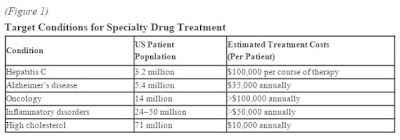Pharmacy benefit manager (PBM) tools that have successfully controlled costs in the traditional small-molecule drug categories will be critical to manage the increasing costs and requirements of the specialty drug category, according to a study published by sPCMA, a division of the Pharmaceutical Care Management Association.
Financial Impact of Specialty Drugs: Current and Projected
In 2014, more than 500,000 Americans filled prescriptions with a value of at least $50,000. This data represents a 63% increase from 2013.
Specialty drugs, primarily biologic agents—such as adalimumab (Humira), sofosbuvir (Sovaldi), and glatiramer (Copaxone)—that treat inflammatory conditions, hepatitis C, and multiple sclerosis (respectively), among others, increasingly account for a significant proportion of overall health care spending.
It’s been estimated that by 2020, 9 of the 10 best-selling drugs (by revenue) will be specialty drugs that treat conditions such as those illustrated in Figure 1. The estimates also indicated that specialty drug spending could reach $400 billion, or 9.1% of national health spending.
However, revised estimates point to the increasing prevalence of biosimilars in the market. Biosimilars are anticipated to curtail the overall biologic market value growth by reducing specialty drug spending to $262 billion by 2019, according to sPCMA.
Specialty benefit design and management tools employed by PBMs will also play a significant role in controlling specialty drug spending, as well as ensuring optimal patient care and support.
 |
| [Click to Enlarge] |
Specialty Benefit Design and Management
Specialty drugs frequently have unique shipping and storage needs, as a result specialty pharmacies are better equipped to procure, store, and dispense these treatments than traditional retail pharmacies. Furthermore, pharmacists and personnel at specialty pharmacies provide patient education and clinical support beyond the capabilities of a retail pharmacy.
The tools in the PBM arsenal are critical to ensure appropriate care for patients needing specialty drugs while managing the often extraordinary costs. A brief sampling of key tools follows:
- Formulary management: Effective use of formularies can minimize overall medical costs, improve patient access to more affordable care, and provide patients improved quality of life.
- Access and utilization management: Drug utilization review, prior authorization, step therapy, quantity or dose limits, and comparative effectiveness reviews can limit a patient’s exposure to inappropriate drugs and lower the high cost of treatment by favoring clinically effective, lower price products.
- Adherence and compliance: PBMs use these programs to improve patient outcomes and reduce the overall cost of care.
- Site of care optimization: Hospital outpatient is one of the most costly settings for the infusion of specialty injectable products.
- Alternative sites of care: Site-of-care management, such as strategies to direct patients to more convenient and less costly sites of service, are critical and can save between 12% and 34% percent — up to $1.7 billion nationally per year.
- Preferred specialty pharmacy networks: PBMs optimize drug distribution via specialty pharmacy networks to reduce inappropriate utilization, improve patient adherence, improve clinical outcomes, and reduce non-drug medical costs.
Summary
Comprehensive management approaches that monitor and balance patient care outcomes and costs will help PBMs ensure that new, innovative medications are readily available and affordable to the patients who need them most.
See more at http://www.ajpb.com/articles/pharmacy-benefit-manager-tools-play-key-role-in-managing-specialty-drug-costs.